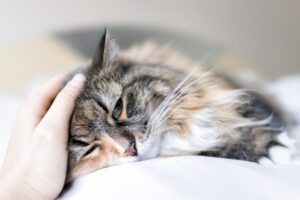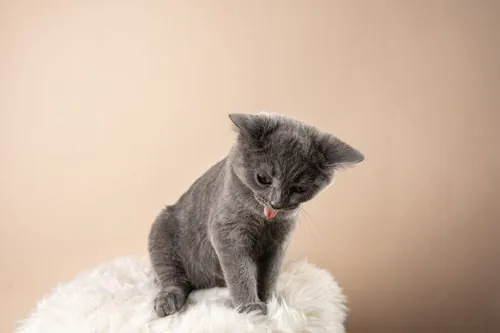8 Signs of Fevers in Cats
Cats are masters at hiding their discomfort, making it challenging for pet owners to spot health issues like fever. In this detailed guide, we’ll explore eight key signs that indicate your cat may have a fever. While a raised temperature can be a normal response to infection, it’s important to be aware of these symptoms to ensure your cat gets the care they need. At The Village Vets in Georgia, we’re here to assist you in understanding your cat’s health. If you notice any of these signs, don’t hesitate to reach out for expert advice or book an appointment at one of our locations.

Increased Body Temperature
Cats normally have a body temperature between 100.5°F and 102.5°F. A temperature above this range could indicate fever. While feeling your cat’s ears and paws for warmth can give you clues, the most accurate way to measure body temperature is with a cat-friendly thermometer. If you suspect your cat has a fever, it’s best to consult with our team at The Village Vets for a precise temperature check and further assessment.
Decrease in Appetite and Thirst
A noticeable decrease in appetite and thirst is a common sign of fever in cats. This change in eating and drinking habits could point to an underlying issue. Monitoring your cat’s eating patterns is vital. If you observe a persistent decrease in appetite or water intake, it’s time to seek professional advice to ensure your cat’s health isn’t at risk.
Lethargy or Decreased Activity
A sudden drop in energy levels or a notable increase in sleep can be a clear indicator of fever in cats. While it’s natural for cats to have lazy days, a continuous lack of interest in play or interaction should raise a flag. If your cat seems unusually tired or unresponsive, it could be a sign they’re not feeling well.
Shivering or Body Chills
Just like humans, cats can experience shivering or body chills when they have a fever. This physical response is an attempt to regulate body temperature. If you notice your cat shivering or looking uncomfortable, especially in a warm environment, it might be time to get in touch with our team at The Village Vets.
Changes in Grooming Behavior
Cats are known for their meticulous grooming habits. A deviation from their regular grooming routine, whether it’s less grooming or an obsessive focus on one area, can be a subtle sign of fever or discomfort. Keeping an eye on your cat’s grooming behavior can help you spot potential health issues early.
Rapid Breathing or Panting
Cats don’t typically pant. If you notice your cat breathing rapidly or panting, it could be a response to fever. This symptom, especially when combined with other signs, should prompt a visit to The Village Vets for a thorough check-up.
Hiding or Avoidance Behavior
Cats often hide when they’re not feeling well. If your cat is suddenly spending more time under beds or in secluded spots, it could be a sign of discomfort or fever. Pay attention to any unusual hiding behavior, as it’s a common way cats communicate their need for help.
Nasal Discharge or Sneezing
While occasional sneezing isn’t unusual, persistent sneezing or nasal discharge can be symptoms of a fever, especially when accompanied by other signs. If your cat shows these symptoms, it’s important to assess their overall health and consult with our veterinarians.
Importance of Veterinary Care
Recognizing the signs of fever in cats is just the first step. Timely veterinary care is essential to diagnose and treat the underlying cause of the fever. At The Village Vets, our team is dedicated to providing the best care for your cat. Don’t hesitate to reach out if you have concerns about your cat’s health. Early detection and intervention can make a significant difference in your cat’s well-being.
When to Contact the Vet
If you notice any of the above signs persisting or worsening, it’s important to contact us at The Village Vets. We’re here to provide expert advice and care, ensuring your cat receives the appropriate treatment. Remember, observing changes in your cat’s behavior and acting promptly can be vital in addressing health issues effectively.
Keeping Track of Your Cat’s Health
Maintaining a record of your cat’s normal behavior, eating habits, and activity levels can be incredibly helpful for both you and your vet. This information can aid in quickly identifying any unusual changes and making informed decisions about your cat’s health.
Caring for your cat’s health means being vigilant and responsive to changes in their behavior and physical condition. By understanding these eight signs of fever in cats, you can be better prepared to identify potential health issues. Remember, at The Village Vets in Georgia, we’re here to support you and your cat every step of the way. For any concerns or to book an appointment, please call or visit one of our locations. Your cat’s health is our top priority.
Recent Posts
About The Village Vets
The Village Vets is a network of animal hospitals based in Atlanta, GA and the surrounding area. We offer honest, excellent service to our clients in a comfortable, friendly atmosphere. To learn more about our locations and how we can better serve you and your pet, click the button below.
Share This Post
Recent Posts
About The Village Vets
The Village Vets is a network of animal hospitals based in Atlanta, GA and the surrounding area. We offer honest, excellent service to our clients in a comfortable, friendly atmosphere. To learn more about our locations and how we can better serve you and your pet, click the button below.



